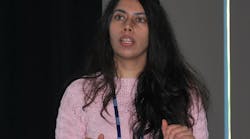For decades, the foundations of cancer treatment have been surgery, chemotherapy and radiation therapy. These continue to be critical mainstays of treatment, but in recent years new categories of treatment have helped transform the treatment outlook for many people with cancer.
CAR T cell therapy, in particular, has been revolutionary, producing durable and effective clinical responses in patients. However, the T cell therapy manufacturing process is complex, labor-intensive, and traditionally has involved many open processes that can impact regulatory compliance and lead to inconsistencies in the final product.
“The therapy is also logistically challenging,” according to Prajakta Bhanap, software engineer for Thermo Fisher Scientific, who spoke this week at the Emerson Exchange Immerse event in Anaheim, Calif.
The process starts with leukapheresis, the extraction of a patient’s white blood cells, and ends with genetically altered cells transfused back into the patient’s body. But the manufacturing workflow in between consists of a series of complex separations, gene transfers, activations and replications. “And it’s always batch size 1,” Bhanap added.
A paradigm shift was needed in cell therapy manufacturing, Bhanap said, and Thermo Fisher Scientific set out to create one. They started with a portfolio of modular instruments designed to support a diverse range of cell therapy manufacturing workflows and efficiently scale to commercial manufacturing.
And to orchestrate the necessary processes they partnered with Emerson to create an off-the shelf software solution called Cellmation that allows users to connect their Thermo Fisher Scientific cell therapy instruments within a standard DeltaV network to control and sequence workflows across multiple cell therapy instruments in a 21 CFR Part 11 compliant environment.
“We selected DeltaV control technologies because we see Emerson as the leading automation provider to the life sciences industry,” Bhanap said.
The DeltaV automation system works with the modular Thermo Fisher instruments in a supervisory role, capturing cGMP batch records in a DeltaV Continuous Historian. All communications are via standard OPC UA, with a DeltaV PK Controller and Emerson Ethernet IO Card (EIOC) also playing the respective roles.
Together, the Cellmation software, Thermo Fisher Scientific instruments and DeltaV control technologies integrate and manage the manufacture of cell therapeutics, ensuring traceable, reproducible and secure data storage and easier data transfer to third-party MES and ERP systems. The full system has been in beta test with several users and is now being released to the market.
“We invest a lot in innovation,” Bhanap said in closing. “And we look to help guide our partners in their journeys, to accelerate cell therapy through industry partnerships.”



